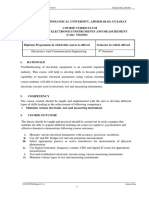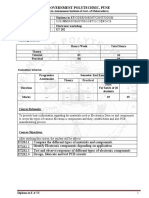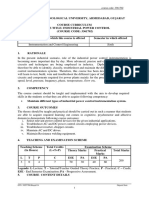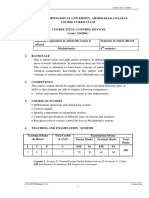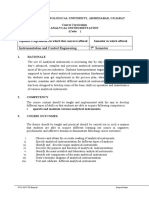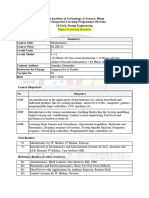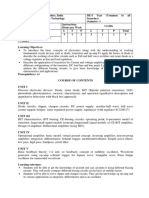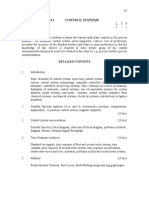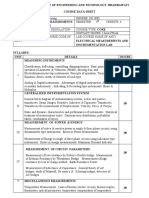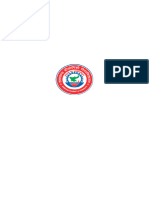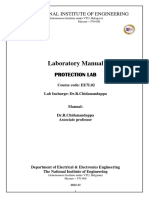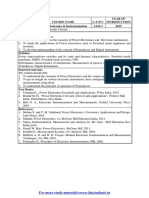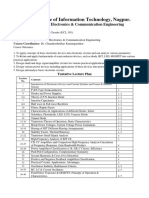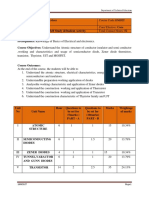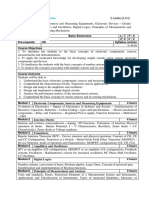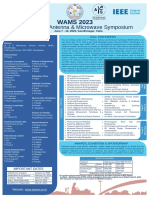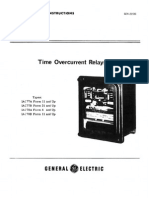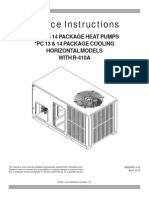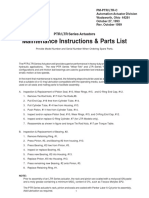Industrial Transducers Course Code: 3321701
Industrial Transducers Course Code: 3321701
Uploaded by
Rohan MathurCopyright:
Available Formats
Industrial Transducers Course Code: 3321701
Industrial Transducers Course Code: 3321701
Uploaded by
Rohan MathurOriginal Title
Copyright
Available Formats
Share this document
Did you find this document useful?
Is this content inappropriate?
Copyright:
Available Formats
Industrial Transducers Course Code: 3321701
Industrial Transducers Course Code: 3321701
Uploaded by
Rohan MathurCopyright:
Available Formats
Industrial Transducers Course Code: 3321701
GUJARAT TECHNOLOGICAL UNIVERSITY, AHMEDABAD, GUJARAT
COURSE CURRICULUM
Course Title: Industrial Transducers
(Code: 3321701)
Diploma Programmes in which this course is offered Semester in which offered
Instrumentation and Control Engineering Second Semester
1. RATIONALE
Transducers are used in almost every industry and also in everyday life. Therefore, a
diploma engineer in Instrumentation and Control Engineering is expected to use,
installed and test the functioning of the different types of transducers being used for
measuring non-electrical quantities in the industry. The course is intended to develop the
basic understanding as well as the competency to install and test various transducers and
sensors for measuring displacement, temperature, radiation, pressure, flow, level, pH,
conductivity, density, velocity, viscosity and such others.
2. COMPETENCY
The course content should be taught and implemented with the aim to develop different
types of skills so that students are able to acquire following competency:
i. Install/test different types of transducers.
3. TEACHING AND EXAMINATION SCHEME
Teaching Scheme Total Credits Examination Scheme
(In Hours) (L+T+P) Total
Theory Marks Practical Marks
Marks
L T P C ESE PA ESE PA
150
3 0 2 5 70 30 20 30
Legends: L-Lecture; T – Tutorial/Teacher Guided Student Activity; P - Practical; C – Credit;; ESE - End
Semester Examination; PA - Progressive Assessment.
Note: It is the responsibility of the institute heads that marks for PA of theory & ESE and PA of
practical for each student are entered online into the GTU Portal at the end of each semester within
the dates specified by GTU.
GTU/ NITTTR Bhopal/12-13 Gujarat State
1
Industrial Transducers Course Code: 3321701
GTU/ NITTTR Bhopal/12-13 Gujarat State
2
Industrial Transducers Course Code: 3321701
4. DETAILED COURSE CONTENT
Unit Major Learning Topics and Sub-topics
Outcomes
Unit – I 1a. State the basic 1.1 Basic requirements of transducers
Transducer requirements of 1.2 Classification based on transduction
Basics transducers phenomenon, type of application, types of input
1b. Classify and list the and output signal, electrical principle involved
different types of i) Active and passive transducer
Transducer ii) Based on application
1c. Compare properties iii) primary and secondary transducers
context to transducers iv) analog and digital transducer
1d. Describe the static 1.3 Static characteristic - accuracy, precision, error,
characteristics of linearity, reproducibility, repeatability, threshold,
transducers dead zone, hysteresis, creep, span, range.
1e. Describe the dynamic 1.4 Dynamic characteristic (fidelity), speed of
characteristics of response, lag, dynamic error
transducers
Unit– II 2a.Describe working 2.1 Resistive Transducers, Inductive Transducers,
Electrical principle of different LVDT, RVDT
Transducers types of electrical i) Capacitive Transducers.
transducers. ii) Piezoelectric Transducers.
2.b Describe the basic 2.2 Strain Gauge Transducers (unbonded and
construction of bonded)
different types of
transducers
2.cTest the listed
transducers
Unit– III 3a. Describe working 3.1 Thermocouple (E,J,K,R,S,T,M,N,B,C, types)
Thermoelectri principle of different 3.2 RTD (Pt, Cu, Ni types)
c Transducers types of thermo- 3.3 Thermistor and semiconductor sensors
electric transducers .
3b. Describe the basic
construction of listed
types of transducers
3c. Test the listed
transducers
Unit– IV 4a. Describe working 4.1 Opto-electronic devices: Photo emissive cells,
Electro-optical principle of different LED, LCD, LDR, IR emitter, Photoconductive
and Radio types of electro optical cells, Photodiode, Photo transistor, Photovoltaic
Acoustic transducers cells, LASER, Opto-coupler
Transducers 4b. State the salient 4.2 Digital Encoders (incremental/absolute)
features of different
types of transducers
4c. Test the listed
transducers
4.c Describe working 4.3 Radioactive acoustic transducers, Geiger Muller
principle of radioactive counter
acoustic and ultrasonic 4.4 Ultrasonic transducers
transducers 4.5 Ion Selective Electrodes
Unit– V 5a. Describe working 5.1 Flow Transducers – Orifice (Concentric,
Industrial principle of flow Eccentric Segmental, Quadrant), Venturi,
Primary transducers. Flow nozzle, Pitot tube, Flapper nozzle.
Transducers 5b. Describe the basic 5.2 Level Transducers – Float type, Displacement
construction of type, Bubbler.
GTU/ NITTTR Bhopal/12-13 Gujarat State
3
Industrial Transducers Course Code: 3321701
Unit Major Learning Topics and Sub-topics
Outcomes
different types of 5.3 Pressure Transducers – Bellows, diaphragm (flat,
transducers corrugated, capsule), Bourdon tube (C type,
5c. State the salient spiral, helical), Swirl & de swirl, Proving ring,
features of different Piston cylinders.
types of transducers 5.4 Temperature Transducers – Bimetallic
5d. Test the listed Thermometers, Filled system Thermometers
transducers 5.5.1 Magnetic flowmeter
2. Mass flowmeter
3. Radar level transmitter
4. Ultrasonic level transmitter
5. Displacer type level transmitter
5. SUGGESTED SPECIFICATION TABLE WITH HOURS & MARKS (THEORY)
Distribution of Theory Marks
Unit Unit Title Teaching
No. Hours R U A Total
Level Level Level Marks
I Transducer Basics 06 08 06 00 14
II Electrical transducers 8 02 08 02 12
III Thermoelectric Transducers 8 02 06 02 10
IV Electro-optical and Radio Acoustic 8 02 08 02 12
Transducers
V Mechanical Transducers 12 02 14 06 22
Total 42 16 42 12 70
Legends: R = Remember; U = Understand; A = Apply and above levels (Bloom’s revised taxonomy)
Note: This specification table shall be treated as only general guideline for students and
teachers. The actual distribution of marks in the question paper may vary from above table.
6. SUGGESTED LIST OF EXPERIMENTS
The experiments should be properly designed and implemented with an attempt to develop
different types of skills leading to the achievement of the above mentioned expected
competency.
Sr. Unit Practical Exercise/Experiment Approx.
No. No. Hrs.
Required
II Test & plot characteristic (Vibration Vs Voltage) of piezo-electric 01
1
crystal.
2 II Test & plot characteristic of resistive transducers. 01
3 II Test & plot characteristic of inductive transducers. 01
4 II Test & plot characteristic (Strain Vs Resistance) of strain gauge. 01
III Test & plot characteristic (Temperature Vs Voltage) of 02
5
thermocouple (J,K,R,S,T,M,N,B,E).
III Test & plot characteristic (Temperature Vs Resistance) of resistance 02
6
temperature detector (Pt-100, Pt-1000).
III Test & plot characteristic (Temperature Vs Resistance) of given 02
7
thermistor.
8 IV Test & plot characteristic (Luminance Vs Resistance) of LED. 01
GTU/ NITTTR Bhopal/12-13 Gujarat State
4
Industrial Transducers Course Code: 3321701
Sr. Unit Practical Exercise/Experiment Approx.
No. No. Hrs.
Required
9 IV Test & plot characteristic (Luminance Vs Resistance) of IR emitter. 01
10 IV Test & plot characteristic (Luminance Vs Resistance) of LDR. 01
11 IV Test & plot characteristic (Luminance Vs Current) of photodiode. 01
12 IV Test & plot characteristic (Luminance Vs Current) of phototransistor. 01
13 IV Test & plot characteristic of Opto coupler. 01
V Test & plot characteristic (Flow rate Vs Differential Pressure) of 02
14
various orifices.
15 V Test & plot characteristic (Flow rate Vs Pressure) of nozzle. 02
V Test & plot characteristic (Flow rate Vs Differential Pressure) of 01
16
venturi.
V Test & plot characteristic (Flow rate Vs Differential Pressure) of Pitot 01
17
tube.
18 V Test & plot characteristics of various level transducers. 02
V Test & plot characteristic (Pressure Vs Linear Displacement) of C 01
19
type bourdon tube.
V Test & plot characteristic (Pressure Vs Linear Displacement) of 01
20
bellows.
V Test & plot (Pressure Vs Linear Displacement) characteristic of 01
21
diaphragm.
V Test & plot characteristic (Temperature v/s Displacement) of 01
22
bimetallic thermometer.
Total 28
7. SUGGESTED LIST OF PROPOSED STUDENT ACTIVITIES
7.1 Students may be given exercises based on transducers to calculate important terms
related to above topics.
7.2 Students may be asked to collect photographs using internet which is relevant to field
application of various topics & have to prepare learning materials using it.
7.3 Teachers guided self learning activities, industrial visit, Course/library/internet/lab
based mini projects etc.
7.4 Students activities like: course/ topic based seminars, Internet based assignments.
8. SUGGESTED LEARNING RESOURCES
A. List of Books
Sr.No. Author Title of the Book Publication/Year
1 Sawhney, A. Electrical & Electronic Dhanpat Rai & Co., 2005 or later
K. Measurements and Instrumentation Edition
Murty, D. V. Transducers and Instrumentation Prentice Hall of India, 2005 or later
2
Edition
Jain, R. K. Mechanical and Industrial Khanna Publishes, 2005 or later
3
measurements Edition
Rangan, Instrumentation Devices and Tata McGraw Hill, 2005 or later
4
Sharm, Mani Systems Edition
5 Kalsi, H. S. Electronic Instrumentation Tata McGraw Hill, 3rd or later Edition
B.G. Liptak Instrument Engineers' Handbook, CRC press
6
Fourth Edition, Volume 1,2
GTU/ NITTTR Bhopal/12-13 Gujarat State
5
Industrial Transducers Course Code: 3321701
B. List of Major Equipment/ Instrument
8.1 Function generator( sine, square, triangle etc.with frequency range 10 Hz to
100 kHz)
8.2 DC power supply ( -30 →0→+30 V with at least 1A current capacity)
8.3 Measuring equipments like CRO ( preferably dual channel, 20Mhz)
8.4 Multimeter
8.5 Circuit/Trainer board/ Demonstration modules of relevant transducers.
C. List of Software/Learning Websites
1 http://en.wikipedia.org/wiki/Transducer
2 http://www.instrumentationtoday.com/
9. COURSE CURRICULUM DEVELOPMENT COMMITTEE
Faculty Members from Polytechnic
1 Prof. R.J.Dhruv, I/C HOD IC ENGG., A.V. Parekh Technical Institute,
Rajkot
2 Prof. R.P.Raiyani, I/C HOD IC ENGG., Christ Polytechnic Institute, Rajkot
3 Prof. N.B.Mehta, LECTURER IC ENGG., Government Polytechnic,
Ahmedabad
4 Prof. H.P.Patel, LECTURER IC ENGG., Government Polytechnic,
Ahmedabad
Co-ordinator and Faculty Member from NITTTR Bhopal
1. Dr. Joshua Earnest, Professor and Head, Dept. of Electrical & Electronics
Engg,
2. Prof. A.S.Walkey, Associate Professor, Dept. of Electrical & Electronics
Engg,
GTU/ NITTTR Bhopal/12-13 Gujarat State
6
You might also like
- At-Nav2 003 Data Sheet Test KNR 634Document12 pagesAt-Nav2 003 Data Sheet Test KNR 634Carlos Andres Barrera BarreraNo ratings yet
- The Technology of Instrument Transformers: Current and Voltage Measurement and Insulation SystemsFrom EverandThe Technology of Instrument Transformers: Current and Voltage Measurement and Insulation SystemsNo ratings yet
- Model W210 Electric Seat AdjustmentDocument29 pagesModel W210 Electric Seat AdjustmentNacho100% (2)
- Course ObjectivesDocument5 pagesCourse Objectivesabhishekash502No ratings yet
- 3311701basic Instrumentation PDFDocument5 pages3311701basic Instrumentation PDFurvish_soniNo ratings yet
- 3320701Document4 pages3320701RajashekarBalyaNo ratings yet
- 3341104Document7 pages3341104Vani YamaniNo ratings yet
- Course Title: Course Code: Program: Epet Department: College: Institution: Jazan UniversityDocument6 pagesCourse Title: Course Code: Program: Epet Department: College: Institution: Jazan UniversityZulkharnain MuhammadNo ratings yet
- 3311101electronic Components & PracticeDocument5 pages3311101electronic Components & PracticeDarshit KotadiyaNo ratings yet
- Government Polytechnic, Pune: (An Autonomous Institute of Govt. of Maharashtra)Document4 pagesGovernment Polytechnic, Pune: (An Autonomous Institute of Govt. of Maharashtra)Madhav DeshpandeNo ratings yet
- 3361702Document7 pages3361702josephNo ratings yet
- 2nd Sem Basic ElectronicsDocument4 pages2nd Sem Basic ElectronicsshinoNo ratings yet
- Transducers and Instrumentation Lab Manual: Mte-317 (L)Document28 pagesTransducers and Instrumentation Lab Manual: Mte-317 (L)Kazekage Tonely FieldNo ratings yet
- Course Title: Process Instrumentation-I: Instrumentation and Control Engineering 4 SemesterDocument7 pagesCourse Title: Process Instrumentation-I: Instrumentation and Control Engineering 4 SemesterAbarnaNo ratings yet
- SyllabusDocument9 pagesSyllabusbhattparthivNo ratings yet
- EDC Diploma SyllabusDocument27 pagesEDC Diploma SyllabusParvinder SinghNo ratings yet
- Syllabus in Fund. Elec3cty and Elec2ronicsDocument6 pagesSyllabus in Fund. Elec3cty and Elec2ronicsJohn Raymund MabansayNo ratings yet
- Gujarat Technological University, Ahmedabad, Gujarat Course CurriculumDocument5 pagesGujarat Technological University, Ahmedabad, Gujarat Course CurriculumRajnish KumarNo ratings yet
- 3360901Document7 pages3360901vims1248993No ratings yet
- Control Devices (CD) 3342001Document7 pagesControl Devices (CD) 3342001BHATT RONAK MT-04No ratings yet
- Syllabus Analytical - InstrumenationDocument9 pagesSyllabus Analytical - Instrumenationurvish_soni100% (1)
- Es Zg511 Course HandoutDocument16 pagesEs Zg511 Course HandoutfenytepeNo ratings yet
- Basic of Electrical and Electronic EnginDocument5 pagesBasic of Electrical and Electronic EnginThien MaiNo ratings yet
- BE First Year, Study MaterialDocument2 pagesBE First Year, Study MaterialVasu GuptaNo ratings yet
- 3 1 PDFDocument15 pages3 1 PDFGjk ChaitanyaNo ratings yet
- Transducers and Signal ConditionersDocument157 pagesTransducers and Signal Conditionersrohit pooniaNo ratings yet
- CAT 1 ADC Syllabus and Question BankDocument2 pagesCAT 1 ADC Syllabus and Question BankjigarNo ratings yet
- 20ec31p Analog ElectronicsDocument9 pages20ec31p Analog Electronicsrizwanahamed7866No ratings yet
- Institute of Industrial Electronics Engineering, (Pcsir) KarachiDocument11 pagesInstitute of Industrial Electronics Engineering, (Pcsir) KarachiQuratulain AnwarNo ratings yet
- Teaching Scheme (In Hours) Total Credits (L+T+P) Examination Scheme Theory Marks Practical Marks Total MarksDocument6 pagesTeaching Scheme (In Hours) Total Credits (L+T+P) Examination Scheme Theory Marks Practical Marks Total Marksritikmachhi7No ratings yet
- E IDocument7 pagesE Ivims1248993No ratings yet
- EMMI Course SheetDocument7 pagesEMMI Course SheetSscet ELECTRICAL ENGG.No ratings yet
- Understand ElectronicsDocument4 pagesUnderstand Electronicskiokovictor48No ratings yet
- Government Polytechnic, Pune: ET2107 - NODocument8 pagesGovernment Polytechnic, Pune: ET2107 - NOG012 Bhise AniketNo ratings yet
- De ZG516 Course HandoutDocument18 pagesDe ZG516 Course HandoutpanyamnrNo ratings yet
- 1152EC142SENSORSANDTRANSDUCERSDocument2 pages1152EC142SENSORSANDTRANSDUCERSswethaNo ratings yet
- Electronic Circuits & Applications Course Code: 4321104: Page 1 of 8Document8 pagesElectronic Circuits & Applications Course Code: 4321104: Page 1 of 8Ashish PatelNo ratings yet
- CSE - 4 - KOE-044 - CT1 Set-1Document1 pageCSE - 4 - KOE-044 - CT1 Set-1Kumar Samar JalNo ratings yet
- DJM3052 Industrial Electronic (UNIT 5) : SensorDocument22 pagesDJM3052 Industrial Electronic (UNIT 5) : SensorShazryl DanielNo ratings yet
- CSE AI Remedial Assesment PaperDocument1 pageCSE AI Remedial Assesment Papersnigdha.chaturvediNo ratings yet
- Diploma ECE Syllabus 3rd, 4thDocument44 pagesDiploma ECE Syllabus 3rd, 4thdebashisroy.eceNo ratings yet
- Protection Lab ManualDocument39 pagesProtection Lab ManualShankara BNo ratings yet
- Basic Electronics SyllabusDocument4 pagesBasic Electronics Syllabushimanshu.joshiNo ratings yet
- DesignDocument3 pagesDesignHKNo ratings yet
- Edc 1ST SemesterDocument2 pagesEdc 1ST Semestersujeetkushwaha10042002No ratings yet
- Analog Electronics: Rahul. S. MahendrakarDocument93 pagesAnalog Electronics: Rahul. S. MahendrakarrsmhdkNo ratings yet
- 2.electronics DevicesDocument6 pages2.electronics DevicesanupNo ratings yet
- Handout 2019Document3 pagesHandout 2019Abni AbhiNo ratings yet
- Edc Lab Manuals1Document78 pagesEdc Lab Manuals1sowmiyaNo ratings yet
- BeeeDocument12 pagesBeeekajalkhandekar429No ratings yet
- Power ElectronicsDocument3 pagesPower ElectronicsTony RossNo ratings yet
- MMM Class - 2-3Document144 pagesMMM Class - 2-3Sriram SuryaNo ratings yet
- Lessonplan Basic Electronics 18ELN24Document6 pagesLessonplan Basic Electronics 18ELN24VinnuhcNo ratings yet
- Diploma in Electronics/ Electronics and Communication Engineering/ Biomedical EngineeringDocument4 pagesDiploma in Electronics/ Electronics and Communication Engineering/ Biomedical Engineeringvpnofficial1No ratings yet
- Applied Electronic Circuits Booklet-1Document46 pagesApplied Electronic Circuits Booklet-1selvaram789No ratings yet
- Analog Electronics Course Code: 3331102Document6 pagesAnalog Electronics Course Code: 3331102Manoj KhatriNo ratings yet
- Power ElectronicsDocument6 pagesPower ElectronicsTushar RathoreNo ratings yet
- Course Code Basic Electronics L T P C BECE101L 2 0 0 2 Pre-Requisite Nil Syllabus Version Course ObjectivesDocument3 pagesCourse Code Basic Electronics L T P C BECE101L 2 0 0 2 Pre-Requisite Nil Syllabus Version Course ObjectivesAmit GuptaNo ratings yet
- Unit 4 - Basic Instrumentation and Measurement Techniques PPT Notes Material For Sem II Uploaded by Navdeep RaghavDocument118 pagesUnit 4 - Basic Instrumentation and Measurement Techniques PPT Notes Material For Sem II Uploaded by Navdeep Raghavavikool1708No ratings yet
- Electrical Characterization of Organic Electronic Materials and DevicesFrom EverandElectrical Characterization of Organic Electronic Materials and DevicesNo ratings yet
- Power Electronics: Lecture Notes of Power Electronics CourseFrom EverandPower Electronics: Lecture Notes of Power Electronics CourseNo ratings yet
- Ijece - Sewage Block Identification and Rescue System Using Wireless Sensor - 1Document6 pagesIjece - Sewage Block Identification and Rescue System Using Wireless Sensor - 1iaset123No ratings yet
- WAMS 2023 Brochure V10Document1 pageWAMS 2023 Brochure V10srilakshmi ANo ratings yet
- 11 November 1987Document64 pages11 November 1987Monitoring TimesNo ratings yet
- Power System Operation Control & Restructuring, 1/e: Book Information Sheet Book Information SheetDocument1 pagePower System Operation Control & Restructuring, 1/e: Book Information Sheet Book Information Sheetahtisham shahNo ratings yet
- TSUMV59XU DatasheetDocument33 pagesTSUMV59XU DatasheetMuhammad Shamrez89% (9)
- Adu451604 PDFDocument2 pagesAdu451604 PDFAnnBliss100% (1)
- Canadian Solar Datasheet MaxPower CS6X P V5.5enDocument2 pagesCanadian Solar Datasheet MaxPower CS6X P V5.5enjugal8252No ratings yet
- S7 U9 WorksheetsDocument14 pagesS7 U9 WorksheetsadiNo ratings yet
- DSE6010/20 MKII: Auto Start and Auto Mains Failure Control ModulesDocument2 pagesDSE6010/20 MKII: Auto Start and Auto Mains Failure Control ModulesAlfian AkbarNo ratings yet
- IT6263 Datasheet v0.8Document16 pagesIT6263 Datasheet v0.8Pravin MevadaNo ratings yet
- SRVCC To UMTS HO Implementation in 3GDocument6 pagesSRVCC To UMTS HO Implementation in 3GbalamuruganNo ratings yet
- STMicroelectronics UA741CN Datasheet PDFDocument11 pagesSTMicroelectronics UA741CN Datasheet PDFAlina ȘtefănesiNo ratings yet
- Manual ViplexDocument64 pagesManual ViplexJUAN FRANCISCO MEJ�A MERCADONo ratings yet
- Rabi 1938Document1 pageRabi 1938Mar MirallesNo ratings yet
- ETL600 R4 Level - 2.2 LowresDocument4 pagesETL600 R4 Level - 2.2 LowresSalvador FayssalNo ratings yet
- Manual Relé GEDocument16 pagesManual Relé GEPablo Briceño NavarroNo ratings yet
- ENG DS DSD 25 Family A4Document7 pagesENG DS DSD 25 Family A4hedayatNo ratings yet
- Manufacturing and Testing of Distribution TransformerDocument17 pagesManufacturing and Testing of Distribution TransformerSaurabh Kumar100% (1)
- ABB Magnetik FlowmeterDocument36 pagesABB Magnetik FlowmeterPurwanto NugrohoNo ratings yet
- Pv033400ar17a Pv033400ar17a Pv033400ar17aDocument19 pagesPv033400ar17a Pv033400ar17a Pv033400ar17aYul GoncalvesNo ratings yet
- Mavigard en v10 - 2009Document48 pagesMavigard en v10 - 2009Mostafa Ali100% (3)
- M1TEX500&1KLT10ENDocument38 pagesM1TEX500&1KLT10ENraan4No ratings yet
- Owners Manual Goodman GPC GPHDocument49 pagesOwners Manual Goodman GPC GPHJuan José SanchezNo ratings yet
- Calvin 8470p 6050a2470001 SchematicDocument73 pagesCalvin 8470p 6050a2470001 SchematicjosueljhNo ratings yet
- Maintenance Instructions & Parts List: PTR/LTR Series ActuatorsDocument8 pagesMaintenance Instructions & Parts List: PTR/LTR Series Actuatorswaltsantos10No ratings yet
- Vivien Silicon Photonics SourceDocument15 pagesVivien Silicon Photonics SourceShriraam SundaramNo ratings yet
- Teledyne 212R 11-29Document28 pagesTeledyne 212R 11-29juan jose claros morenoNo ratings yet
- Implementation of 8Ã 1 MultiplexerDocument5 pagesImplementation of 8Ã 1 MultiplexerFrancesco De FlorenceNo ratings yet






